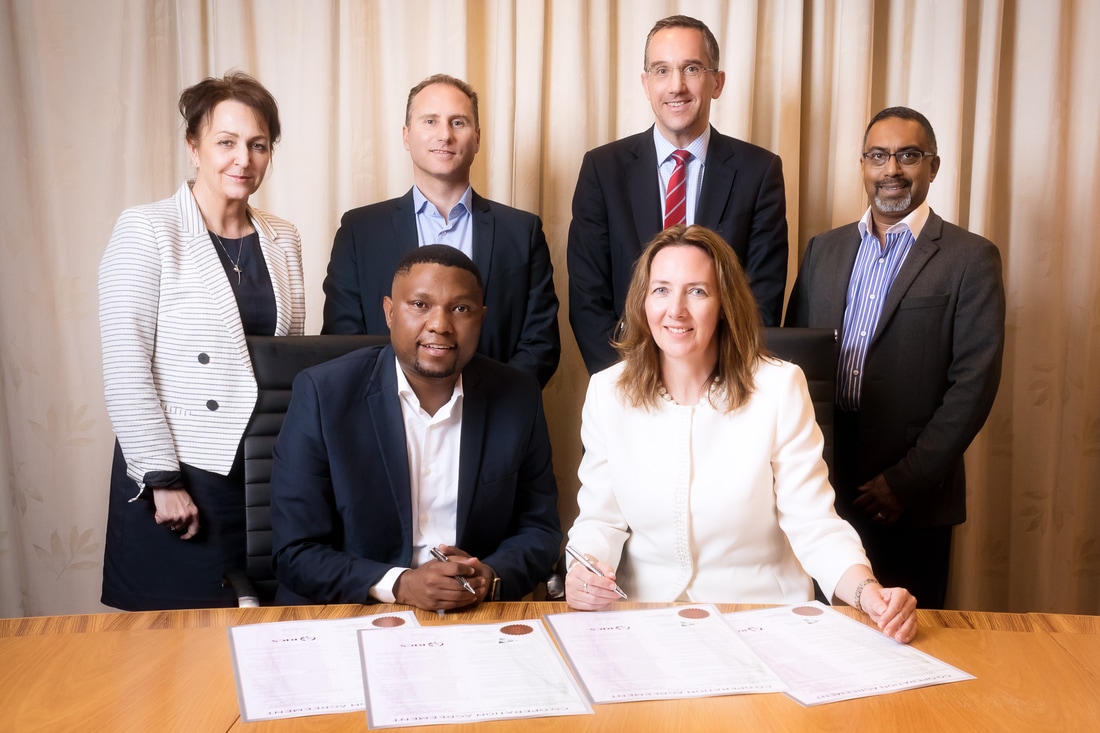|
In March 2017, the Association of South African Quantity Surveyors (ASAQS) and the Royal Institution of Chartered Surveyors (RICS) signed a Memorandum of Agreement (MoU) to further professional development and information sharing for members of both institutions. Members of ASAQS will benefit from international accreditation as well as the ability to work in the United Kingdom and elsewhere thanks to the MoU. “Professionals in the South African quantity surveying industry provide world-class solutions to architects, consulting engineers and contractors. We are pleased that the MoU with RICS will enable ASAQS members to offer their expertise abroad,” says Larry Feinberg, Executive Director, ASAQS. RICS is one of the world’s most prominent professional bodies for qualifications and standards in land, property, infrastructure and construction. The solidified relationship between the two bodies ensures that ASAQS members interested in getting involved in international projects now have the right levels of accreditation and qualification to do so with ease. ASAQS and RICS are both deeply entrenched within the quantity surveying and built environment industries and the associations are actively involved in a variety of committees and forums in the communities and countries in which they operate. The relationship between the associations will create new opportunities for information sharing as well as industry analysis and insight. “At ASAQS, our goal is to represent the interests of our profession globally and make sure that members have the tools, information, accreditation and support that they need to further their business ventures as well as uplift the industry as a whole. Being internationally recognised and paving the way for more cross-border work for our members is a significant milestone that all of us can be proud of,” says Feinberg. TC Chetty, Country Manager South Africa, RICS, says: “We have taken great pleasure working with ASAQS over the years, and it is important for us to reach this milestone and take our relationship to the next level. Partnering with an established and prominent organisation like ASAQS takes us one step closer to achieving our goal of sharing important information to a wider audience within the built environment.” ENDS MEDIA CONTACT: Cathlen Fourie, 082 222 9198, [email protected], www.atthatpoint.co.za For more information on ASAQS please visit: Website: http://www.asaqs.co.za/ Facebook: The Association of South African Quantity Surveyors
0 Comments
ASAQS is committed to transformation and skills development in the built environmentThe built environment is one of many industries that faces challenges due to the skills crises. Exacerbating the issue locally is a lack of transformation, retiring baby boomers, too few formalised training and apprenticeship programmes as well as a lack of funds to support minority groups who are studying towards qualifications within the industry. Larry Feinberg, Executive Director at the Association of South African Quantity Surveyors (ASAQS), says that industry bodies such as ASAQS have a key role to play in promoting growth and transformation in the industry. “Besides the initiatives that have been launched by the private sector and government, industry associations are the stakeholders who can take action on a grassroot level to help alleviate skills development and transformation problems that are being faced within their sectors,” says Feinberg. One way that ASAQS is helping to make a difference is by launching a programme that supports quantity surveying students in achieving the necessary qualifications to become registered professionals. “Training in the built environment sector is important because it continues to provide the critical skills needed to design, construct, operate and maintain ever-increasing public and private infrastructure,” says Feinberg. Cities around the world are being are becoming highly populated and often, over burdened by the trend towards urbanization. People are continually gravitating in huge numbers towards the cities and towns to find economic opportunities and in the process the capacity of current infrastructure is being tested on all fronts. Critical skills are increasingly required to provide and maintain new infrastructure such as roads, essential service and buildings, to name but a few. “To meet this need, we require quality educational opportunities focused on the built environment which produces capacitated clients, professional quantity surveyors, engineers, project managers and skilled contractors and artisans,” Feinberg continues. “Clearly, the growing demand for infrastructure fuelled by urbanization calls for more, not less education and training in the built environment sector. We should recognise this trend and then make every effort to match up to it.” Feinberg expects the quantity surveying profession, along with other sectors within the construction and built environment, to be supported in their skills development and transformation endeavours through the 1.5 billion Tirisano Fund, which forms part of the Voluntary Rebuild Programme (VRP) Agreement between government and seven companies found guilty of collusion during the construction of stadiums for the 2010 Fifa World Cup. The fund is focused on providing support to black students studying engineering, quantity surveying and building science, among other disciplines, and could potentially play a vital role in stimulating transformation and growth. “ASAQS fully supports this initiative and is excited to be able to offer a training programme that can help students thrive in the built environment and graduate to become qualified quantity surveyors,” concludes Feinberg. ENDS MEDIA CONTACT: Cathlen Fourie, 082 222 9198, [email protected], www.atthatpoint.co.za For more information on ASAQS please visit: Website: http://www.asaqs.co.za/ Facebook: The Association of South African Quantity Surveyors Quantity surveyors are best positioned to keep public infrastructure spend on track, despite 83% of government infrastructure spend currently managed by engineers.  An estimated R875.70 billion has been committed to a number of ambitious government infrastructure projects for the Medium Term Expenditure Framework (MTEF) until 2019/2020), according to the figures given in the national budget and publicly available information on projects and their budgets. Herman Berry, a member of the Building and Property Economics Committee of the Association of South African Quantity Surveyors (ASAQS) and Executive: Program, Cost, Consultancy (Africa) at AECOM, says that this is a substantial number, and represents a very welcome commitment to service delivery and upgrading our national competitiveness. “Despite the bulk of the infrastructure spend actually being managed by engineers, the priority now must be to ensure that the projects are delivered on time and on budget—and greater involvement by professional quantity surveyors is the best way to do that,” he adds. Why does it matter who manages the project costs? Berry says that the spend is spread across the key sectors of education (R50.1 billion), energy (R234.5 billion), health (R35.6 billion), human Settlements (R102.5 billion), transport and logistics (R327.5 billion) and water and sanitation (R125.3 billion). He points out that infrastructure spend in education, health and human settlements is primarily contracted through the Department of Public Works and the costs are traditionally managed by quantity surveyors. By contrast, projects in the other sectors are largely under the cost control of engineers. These projects account for 83 percent of the projected spend in this budget (R726 billion). “It is perhaps worth mentioning that the energy and transport sectors, where quantity surveyors have no formal control over project costing and accounting, have seen some of the most spectacular cost overruns in recent years. “Engineers are judged by the quality and aesthetics of their designs and thus, quite rightly, those are their main priorities. Cost is, however, a primary consideration for the quantity surveyor, who produces a Bill of Quantities from the engineer’s design. The Bill of Quantities remains the baseline for the project and all payments, and the foundation for the final account, which the quantity surveyor must draw up and be able to justify.” The ASAQS has previously called for all government projects worth R10 million or more to have a quantity surveyor made responsible for the overall project and, particularly, the final accounts in an attempt to stem corruption. While corruption may be the cause of some cost overruns on big projects, there are many other factors at play. The real point is that a quantity surveyor has the professional know-how and commitment to scope the project costs and quantities properly, and then ensure that it remains within scope. “These are ambitious projects, and it is highly desirable they are achieved and that the country gets what it paid for. The best way to ensure that is to get quantity surveyors involved—we are trained to ensure that a client’s money is spent as originally planned, and that any deviations are properly documented and authorised before payments are made,” Berry concludes. “We believe government should bear this in mind when it frames the terms of its tenders.” ENDS MEDIA CONTACT: Cathlen Fourie, 082 222 9198, [email protected], www.atthatpoint.co.za For more information on ASAQS please visit: Website: http://www.asaqs.co.za/ Facebook: The Association of South African Quantity Surveyors Project delays can have a significant impact on trust and budget if not handled adeptly from the start, and now there are tools which can help to transform the challenge by Dr Hendrik Prinsloo, Course Facilitator, The Association of South African Quantity Surveyors (ASAQS)  When it comes to delays and the assessment of delay claims, there is limited guidance available. In fact, there is no clear path in terms of managing the issue, establishing process or determining who is ultimately responsible. The result is that many unexpected delays end in disputes which can potentially impact on relationships and the success of a project. There has long been a need for the industry to have access to a simple, standardised process which walks all parties through the claim and finds equally simple answers to the problems. This need inspired the development of the Decision Support Framework, a tool designed to assist in the assessment of claims from the start, eliminating indecision and uncertainty and providing users with a clear route to resolution. The framework was crafted over a number of years, and was designed to be easy to understand and capable of managing claims across industry and incident. The Decision Support Framework is currently being integrated as part of the Association of South African Quantity Surveyors’ (ASAQS) member toolkit via continuous professional development (CPD) training courses which are being offered around the country. The intended outcome is to assist quantity surveyors in making accurate assessments, determining root causes and, ultimately, saving customers money. Alongside supporting the more accurate and efficient assessment of delay claims, the tool adds a sense of fair play – the standardisation of process and procedure allowing all parties equal say. Often, there is no small measure of uncertainty when it comes to claim assessments, so if all parties are using the same resource, it ensures that both client and contractor have the same input, see the same results and have their concerns acknowledged. This can also have a positive impact on time spent with claims, reducing disputes and saving on costs. The goal is to complete the project, not become embroiled in lengthy debate or lose money as the days tick by and the build remains dormant. In any industry, time is money. More so in the construction industry where time delayed decisions can result in a cost per day impact. Likewise, a delay in the delivery of materials to site, can impact costs. By identifying delays and ensuring swift resolution, the Decision Support Framework can have immediate and long-term cost savings. The quantity surveyor can assist in determining the delay far more efficiently and this can significantly lower the financial implications which normally come hand in hand with any delay claim. The Decision Support Framework sidesteps the usual problems by taking the user through four primary decision making processes. Each of these has been carefully researched to fit alongside the extension of time claims, and each one uses a process to allow for deliberation and careful resolution. The tool helps to arrive at the easiest conclusion as users follow the steps to a solution and find a mutually beneficial agreement. For those who are cost conscious and who always keep a keen eye on the bottom line, this Decision Support Framework methodology will add another metaphorical arrow to the professional quantity surveyors quiver. By virtue of the work that quantity surveying professionals undertake, they regularly find themselves at the centre of cost related misunderstandings, while being ever mindful of bringing the project home within budget. The ASAQS’s EduTech Division has identified the need to bring clarity to both the construction industry and to the associations QS professionals, by offering bespoke training that provides the participant with a broad understanding of the principles and best practice around this sensitive issue. ENDS MEDIA CONTACT: Cathlen Fourie, 082 222 9198, [email protected], www.atthatpoint.co.za For more information on ASAQS please visit: Website: http://www.asaqs.co.za/ Facebook: The Association of South African Quantity Surveyors |
Archives
July 2024
Categories
All
|



 RSS Feed
RSS Feed